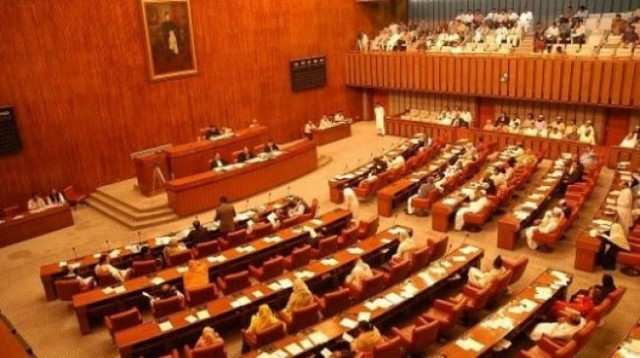Ministers’ absence annoys Senate chairman
Issues show-cause notice to defence secretary for not submitting reply

Rabbani had adjourned the house for an indefinite period and stopped working as chairman of the Senate last week in protest over apathy of the ministers towards the house proceedings and several ministries repeatedly failed to furnish replies to written questions of senators. PHOTO: EXPRESS
The government’s callous attitude once again incensed the Senate chairman, who issued another warning to the government over the absence of relevant ministers, and chastised the defence secretary by serving notices on him, asking to appear before the Senate Standing Committee on Rules of Procedures and Privileges.
Rabbani had adjourned the house for an indefinite period and stopped working as chairman of the Senate last week in protest over apathy of the ministers towards the house proceedings and several ministries repeatedly failed to furnish replies to written questions of senators.
Incensed by govt's attitude, chairman leaves Senate in a huff
Rabbani resumed work after Finance Minister Ishaq Dar gave assurance to him on behalf of the prime minister to address his grievances.
But it seemed that even the prime minister’s intervention could not improve the situation on the matter. “Do you want me to repeat Friday’s practice?” Rabbani asked Minister of State for Interior and Narcotics Control Muhammad Balighur Rehman.
Rabbani said about nine questions had not been answered again while three ministers concerned, i.e., interior, defence production, water and power, remained absent. To which Rehman replied that “no, chairperson, do not take that action”.
PPP Senator Farhatullah Babar wanted to know the details of pension and other benefits admissible to the officers of the rank of major general and above of Pakistan Army, Navy and Air Force on their retirement.
Senate seeks greater constitutional role
A brief written answer of Defence Minister Khawaja Muhammad Asif, who was not present in the house, merely said that the information was being collected and will be provided as soon as received.
“What is the information being collected. It is a question pertaining to the general policy and they do not have the answer to that,” Rabbani remarked.
Referring to the missing replies to some written questions, Rabbani said why was sharing information on top bureaucrats, proscribed organisations and perks and privileges was made such a big deal.
“If some ministers are with the PM, then they should read the notification of the PM who said that parliamentary business will take priority over any other thing.”
The Senate chairman also directed chief of the Senate Privileges Committee Senator Dr Jehanzeb Jamaldini to issue show-cause notice to the defence secretary for not submitting the reply.
Replying to a question of Senator Farhatullah Babar in the Senate, Interior Minister Chaudhry Nisar Ali Khan has rubbished aside the provincial government’s request to monitor 94 suspected seminaries and termed the information “insufficient, ambiguous and without any credible evidence”.
The Sindh government, through a letter written to the interior ministry, had sought proscription of 94 ‘suspected’ religious seminaries. Babar had asked about the list of 94 seminaries in Sindh, and whether any action has been taken by the government and if not then reasons thereof.
The interior minister also stated that no evidence or proof was shared by the government of Sindh with regard to the so-called suspected seminaries.
“No action has been taken by the ministry in this regard because no evidence or proof was shared by the Sindh government with regard to the so-called suspected seminaries,” he stated in his reply, adding: “The letter of the Sindh government lacked legal clarity and substance which a communication of such nature must have.”
Rabbani agrees to return to Senate
The letter also listed seminaries from Khyber-Pakhtunkhwa, Punjab and Balochistan which was beyond the legal territorial jurisdiction of the government of Sindh, the minister maintained, adding: “It did not clarify as to why an extra-territorial list was sent to the federal government.”
“The provincial government only provided one-page summary, indicating names of the cities where the seminaries are allegedly located,” he said and added: “It sent an additional list of 55 names containing general location of the seminaries in Karachi and Sukkur only.”
He concluded that from the communication of the government of Sindh it was evident that it failed to meet the requirement of Section 11B(1) of the Anti-Terrorism Act, 1997.
“Mere assertion of suspected seminaries without any corresponding details and involvements cannot be made a basis for an affirmative action which was to be justifiable before courts of the competent jurisdiction,” Nisar said.



















COMMENTS
Comments are moderated and generally will be posted if they are on-topic and not abusive.
For more information, please see our Comments FAQ